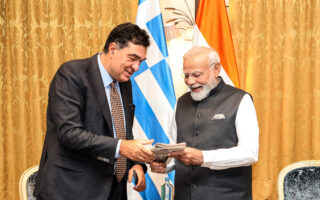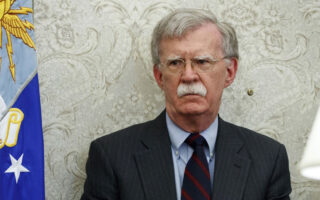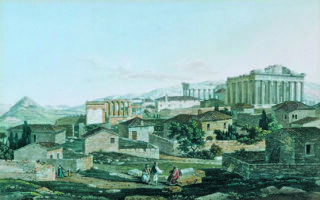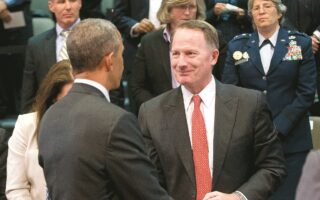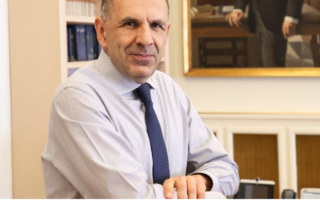Aegean Sea should be a ‘source of cooperation’
When Greek-Turkish dialog is based on goodwill, openness, and trust it always achieves 'satisfactory results,' Gul tells Kathimerini
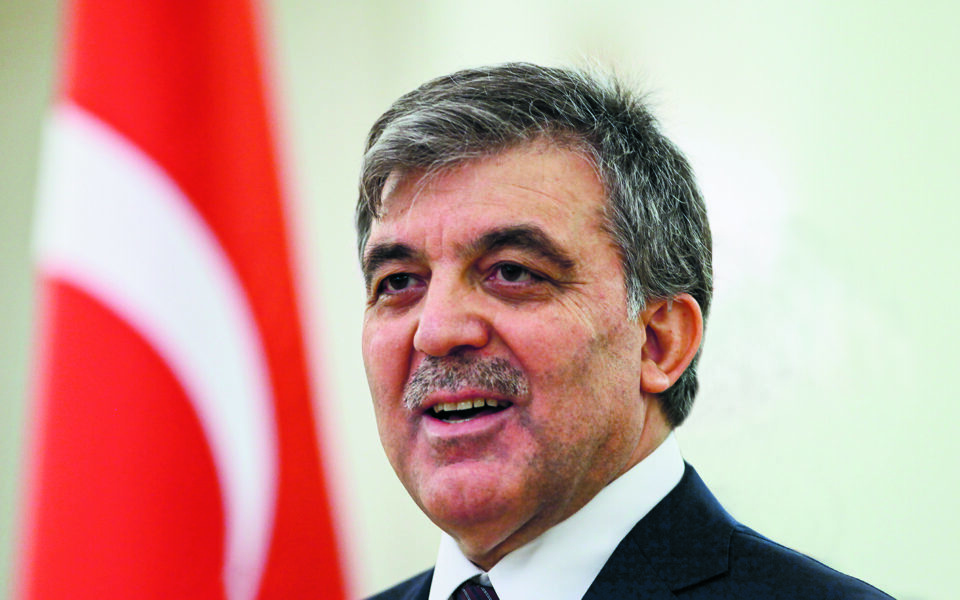
“Turkiye and Greece are two neighbors whose past, present and future are undeniably intertwined,” former Turkish president Abdullah Gul stated in an exclusive interview. Turkiye’s former head of state (president from 2007 to 2014), having served in the highest echelons of the Turkish political scene, including as prime minister and foreign minister, and having participated in the Greek-Turkish negotiations since 2003, says on the Cyprus dispute that “a finale chance can be given to reach a just solution.” As a supporter of Turkiye’s European integration process and a friend of Greece, former president Gul describes the points of the Greek-Turkish friendship, but also highlights the long-standing thorns in relations between the two states.
Twelve years ago you stated that “Europe is the cradle of democracy, rule of law and respect for human rights,” while in another statement you underlined that “Turkiye committed to EU membership, but not at any cost.” Today, after all the geopolitical and political changes, do you still insist that Turkey should join the EU, and how likely is this to materialize?
Geopolitical and political changes, whatever and whenever, do not modify core values and well-established realities. Therefore, I still believe that Europe represents an important cradle in these mentioned areas. This certainly needs to be supported with a comprehensive and inclusive approach. Within the scope of my previous duties, I underlined the importance of fulfilling the Copenhagen requirements and Maastricht criteria for Turkiye. These criteria possess a structure to make any country more resilient in political and economic terms. Therefore, their fulfillment has a deeper meaning than becoming a member or not. It is about raising the standards to the universal levels. At the end of the day, Turkiye’s accession to the EU will depend on a political decision to be taken by both sides. So it may end positively or negatively under that time’s circumstances. However, adaptation of these standards will be to our benefit in any case.
Since the launch of accession negotiations with the EU, our journey has not been on the expected track because of several reasons stemming from both sides. We should admit that during recent years, Turkiye went through tough times facing some domestic challenges and a failed coup d’etat attempt. It is obvious that these developments tied our hands to meet certain necessary criteria. Now, the current leadership and government in Turkiye are willing to advance the positive agenda with the EU and to revitalize the accession process. I fully support this approach to be recognized and supported by the EU side as well. Remembering that it takes two to tango, both sides need to stick to the positive agenda that they share, with a truly strategic vision. Such an outcome will also yield a conducive climate to enhance Turkish-Greek relations.
The two countries share borders on land and sea, and our cultures are linked. How do you view the current state of relations between Greece and Turkiye?
This connectedness makes Turkish-Greek relations much more special at the state and people-to-people levels. I am pleased with the normalization process between our countries with the help of solidarity diplomacy and increased contacts. Therefore, I fully support this initiative taken timely and accurately by President [Recep Tayyip] Erdogan and Prime Minister [Kyriakos] Mitsotakis. It is very promising to see them agreeing to maintain the positive momentum reached in bilateral relations during their last meeting in New York on the sidelines of the UN General Assembly. The two leaders went through the recent elections with considerable success. They have the support of their people as well as the necessary time ahead of them to realize their shared goals. This presents an important advantage to materialize the ongoing positive agenda. Furthermore, in both countries, the recently appointed foreign ministers are experienced enough to make progress on the settlement of the existing disputes. They should orient their governments and leaders accordingly. The bilateral diplomatic contacts that were agreed to be accelerated present a key role in that sense. These contacts should be carried out with determination and intensive care. The leaders should monitor this process very closely by putting it among the top priority issues of their foreign policy agenda. While doing so, it is important not to fall into the trap of populist rhetoric with domestic concerns that can hijack bilateral issues in both countries and derail the achievements.
An approach laid on goodwill, openness, trust and empathy always makes a difference in the development of our relations. When I applied this policy in my previous capacities with my Greek counterparts, we obtained satisfactory results. In a similar vein, now, we should stick to the positive agenda with a strategic vision without tactical moves. Political will, time and conditions are definitely on our side to ensure advancement in our relations. Our people will be definitely glad to reach such an outcome.
Turkiye and Greece have had historical maritime disputes over territorial boundaries in the Aegean Sea. Greek Prime Minister Mitsotakis stated that resolving our issues via The Hague requires compromise. In your view, what steps do you think are necessary to address these disputes and promote stability in the region?
The Aegean Sea is our common treasure. It should present a source of cooperation, not conflict. To solve all outstanding issues in the Aegean, diplomacy and international law must prevail over the logic of confrontation. Such endeavors would pave the way to a just, lasting, comprehensive and equitable settlement to the Aegean issues that would be acceptable by both sides. We need to respect each other’s legitimate rights and vital interests there. Cultivating empathy and putting yourself in the other’s shoes are of utmost importance in that sense. In this regard, the freedoms of the high seas and the air space above them should not be impaired. Any other step to be taken should be based on mutual consent in a fair and equitable framework. Such a constructive approach will contribute to promoting stability and prosperity in our region. So, we need to focus on what we can all gain avoiding a maximalist approach.
The Cyprus dispute is characterized as the historical conflict of Greek-Turkish relations. Since 1974, a final solution that is fruitful for both populations has not been reached. Forty-nine years later, in which direction should the two countries work, and what proposals would you like to put forward?
The Cyprus issue, the beginning of which goes back to 1963, stands as a challenge not only for further developing Turkish-Greek relations but also for unleashing the true potential of the Eastern Mediterranean. We unfortunately lost many opportunities for its settlement. The 2004 Annan Plan that I personally endorsed and led was a missed chance in that sense. If the island could have joined the EU as a whole, we would not have such an issue. The status quo on the island that continues more than a half century later cannot last forever. My personal assessment is that a final chance can be given for a limited time to the UN to broker a deal to reach a just, lasting, sustainable and mutually acceptable settlement to the Cyprus issue based on the realities on the island. Turkish Cypriots’ equal inherent rights should be respected in such an initiative. If this last initiative fails again, then the two sides should embark on negotiating modalities for a solution to ensure their coexistence on the island, taking into account of course each other’s sovereign equality and equal international status. Settlement of the Cyprus issue will contribute to the resolution of several problematic matters, from energy supply, regional security to NATO-EU cooperation, and bring prosperity to the Mediterranean. So, we need to focus on what we can all gain, avoiding a maximalist approach.
The war in Ukraine reshaped the geopolitical chessboard by emphasizing the role of the Eastern Mediterranean. As NATO state members, do you think the two countries can work together to maintain stability in the region, and how could problems such as the migration crisis be resolved?
The war in Ukraine has reshuffled geopolitical cards in Eurasia and this directly affected the Eastern Mediterranean. Indications unfortunately show that the war in our common vicinity will not end soon. As Turkiye and Greece, we should have a coherent approach in order to protect ourselves from its negative effects. We should be both vocal on the protection of Ukraine’s territorial integrity and sovereignty in the face of Russia’s aggression. We should develop a common stance in finding ways to settle this war that negatively affects the stability in the Aegean. As two member-states of NATO and two neighbors, this is our shared duty. With regard to irregular migration, which started before the war in Ukraine, the relevant authorities of the Turkish and Greek sides are already in contact. There is always room for better cooperation to mitigate negative effects of this common challenge. In this regard, the March 18 Agreement (2016) can be an instrument for us if implemented fully by the EU. The international community should act as well to urgently find solutions for eradication of the root causes of this humanitarian crisis.
The importance of economic cooperation between Greece and Turkiye is always highlighted in your interviews, what opportunities do you see for enhancing trade and cultural ties between the two nations?
Enhancement of Turkish-Greek economic relations is the easiest and fastest item to be materialized in our agenda. The trade volume between our countries is far from reflecting its real potential. From finance to energy, transport, health and tourism, there is a variety of fields in which we can strengthen the ongoing cooperation. I was very supportive when National Bank of Greece purchased a prominent bank in Turkiye in 2006. In my capacity as foreign minister, I defended this purchase in the Grand National Assembly of Turkiye to overcome contestations of the opposition. When we can increase mutual direct investments, our economies will become more dependent. This interdependency will give us leverage to defend each other’s interests in the region and beyond.
Sharing two sides of the Aegean Sea is far beyond being only a geographical reality. Our music, our food, our traditions, our cultural values are so close to each other that it is difficult for an outsider to understand. People of the two sides are the first ones who come to the other’s aid in difficult times, as we witnessed during the 2022 and 1999 earthquakes in Turkiye and wildfires in Greece during the last years. The deep-rooted friendship between Turks and Greeks is our valuable asset. This is cherished with the cultural heritage that we share in the region. So, we can promote this heritage through joint tourism projects. Overall, I truly believe that empowerment of our economic and cultural ties will give a significant impetus to the resolution of the political disputes between our countries.
